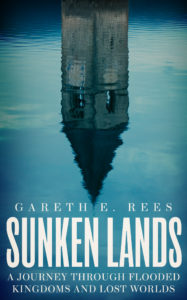Book Review – April 2024
I started my journey with hope that I could contribute in a microscopic way to the groundswell of storytelling that might help us see what has gone wrong with our civilisation and understand what we might learn from our ancestors’ experiences of global warming in the early Holocene. But as I travelled through sunken lands, I realised that I was far from the heroes I imagined in my childhood novels. The middle-aged me was a deeply anxious person , endemically pessimistic and prone to compulsive catastrophising. This made me either the ideal person to write this book or the worst.

Gareth Rees’ last work, Terminal Zones, was a collection of short stories set in the near future. Its focus was an England beset for a series of catastrophes all of which were triggered by climate change. Sunken Lands opens up Rees’ urgent warnings about the climate crisis to consider his concerns on a global level and to place his analysis in a deeper historical context.
There is a story etched into the rocky shell of our planet. Geologists present us with conclusive evidence that history is cyclical; that the physical processes determining the fate of life on Earth are subject to climactic and tectonic ebbs and flows. In this, Rees’s most ambitious work to date, he charts the many cycles of lands that emerge from beneath the waves and the flora, fauna and humans that gradually move in and prosper, only to be forced out again many thousands of years later as the sea returns to reclaim the land. Beneath the waves of coastal regions all over the world are remnants of forests, plains and the ruins of human settlements.
While climate disasters are inevitable natural phenomena, humankind repeatedly fails to mitigate the effects of such events because of their collective obsession with profit and economic growth. Rees charts how, time and again, our low-lying regions are subject to cycles of flooding. As a result, whole eco-systems are destroyed. However, climate-related destruction for one species, provides opportunities to flourish for others.
One subject not addressed by Rees is that of deliberate flooding in the name of progress. In China, Africa and elsewhere in the world one can point to many examples of valleys, villages and farmsteads deliberately flooded as part of civil engineering schemes designed to provide irrigation and hydro-electric power. Closer to home the Tryweryn valley, a rural community in North Wales, was flooded in 1965 to provide water for Liverpool. The plan was pushed through despite being opposed by all 125 Welsh local authorities and 27 of the 36 Welsh MPs.
Rees gives examples of flooding from his study of the available scientific research, but he also retells many of the numerous flood myths handed down in human cultures across the globe: from Wales to the Middle East to the Americas. Myths which seem to suggest a folk memory of real events otherwise lost in the shadows of pre-history.
Naturally, Rees writes about Atlantis, the most well-known of the flood myths. But he also spends time visiting and writing about flood myth locations closer to home, in particular Cardigan Bay in West Wales. Cantre’r Gwaelod (the Lowland Hundred in English) was, according to legend, a low-lying land attached to the current coast of Cardigan Bay. Various myths relate how the Cantre’r Gwaelod was lost, but the most common tells of a night of drunken carousing and a guard who neglected to close a vital flood gate. The Lowland Hundred were also a noughties band from Aberystwyth and some of their music is included on the Sunken Lands Spotify playlist which accompanies the book.
Rees makes it clear that further sea level rises and floodings as a result of climate change are now inevitable. We have not heeded the warnings that climate scientists have been voicing since the 1970s and we have now passed the point of no return. Rees does not offer solutions, but instead he provides us with a coherent picture of what is happening with our climate now, what has happened in the past and what will inevitably happen in the future.
Gareth E. Rees
 Gareth E. Rees is the author of Unofficial Britain, longlisted for the Ondaatje Prize and one of The Sunday Times best books of the year 2020. He’s also the author of Car Park Life, The Stone Tide and Marshland. His first short story collection, Terminal Zones, was published in 2022 and examines the strangeness of everyday life in a time of climate change
Gareth E. Rees is the author of Unofficial Britain, longlisted for the Ondaatje Prize and one of The Sunday Times best books of the year 2020. He’s also the author of Car Park Life, The Stone Tide and Marshland. His first short story collection, Terminal Zones, was published in 2022 and examines the strangeness of everyday life in a time of climate change

Another great book recommendation, Bobby. I shall order it.
Thanks
Thanks Sandy
I already knew about this one from halfman halfbook but you put forward a good argument for getting hold of it. I learned a lot about Tryweryn when working on Brittle With Relics of course.
Thanks Liz. It’s probably Gareth’s best yet.